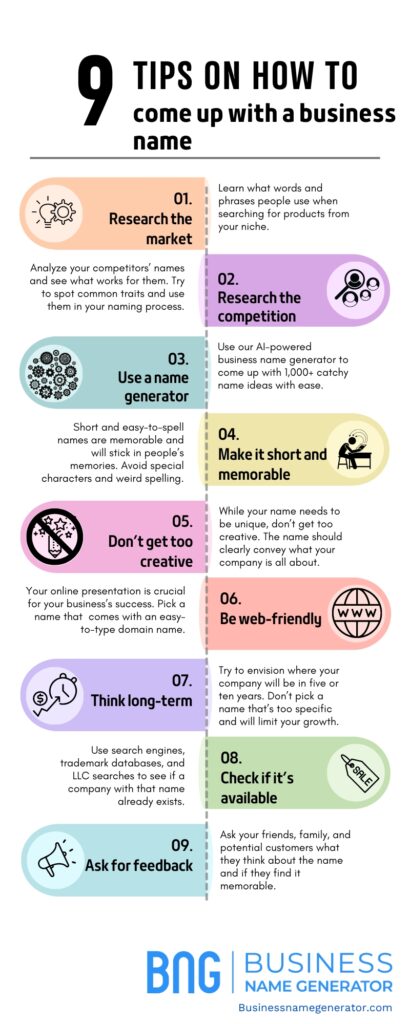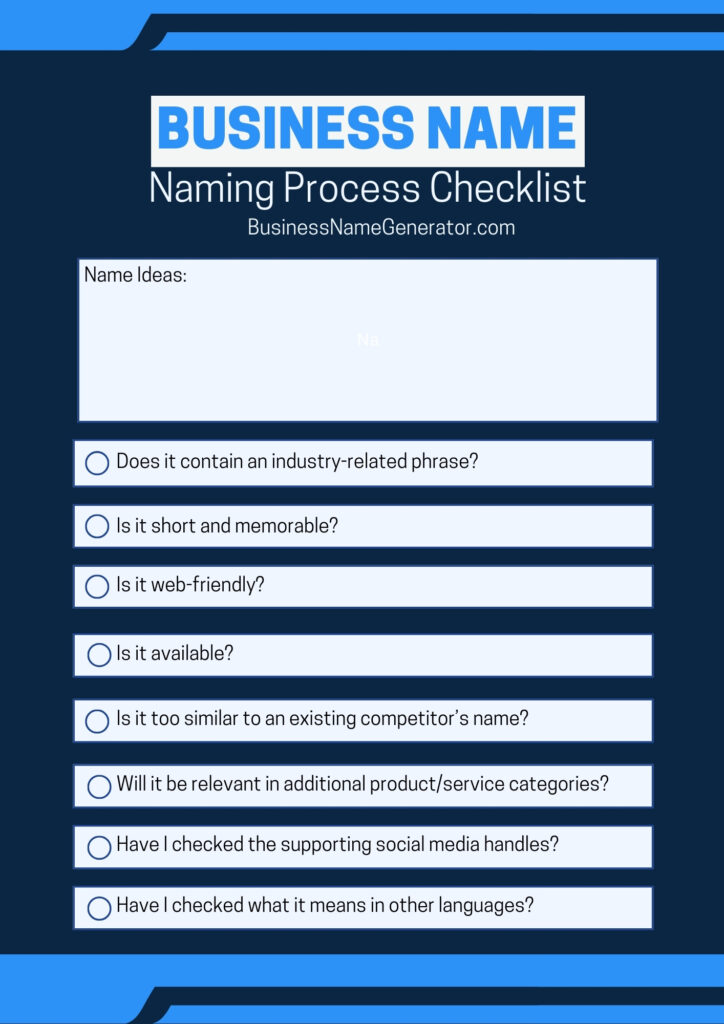According to the U.S. Small Business Administration, there were over 33 million businesses in the United States in 2023, yet less than 35% of all companies still operate ten years after their founding. It’s becoming increasingly important (and challenging) to come up with a unique business name that will help you build a recognizable brand for years to come.
The tricky part is, you have to settle on a name before you start your company. That’s why we’ve created a guide on coming up with a business name to help you pick the perfect one for your new venture.
How to Come Up With a Good Business Name: 9 Tips
Naming your business is one of the core elements of starting a company. You might be creative enough to come up with a name on a whim, but you shouldn’t rely on your gut feeling. Hopefully, your name will be with you for years to come, and you should have a structured approach to naming your business.
Use the following tips to come up with a great business name:
- Research the market,
- Research your competition,
- Use a name generator,
- Make it short and memorable,
- Don’t get too creative,
- Be web-friendly,
- Think long-term,
- Check if a business name is taken,
- Ask for feedback.
1. Research the Market
What do we want when we buy battery cells? We want them to be durable. Even if you’ve never heard of Duracell, you can immediately assume what they offer and what sets them apart.
Before you start coming up with ideas, research the market and try to find frames of reference and words people associate with your niche. You can try to think of keywords on your own or use various tools such as Google Keyword Planner, Google Search Console, and some paid tools like Ahrefs and Semrush.
The research can also help you develop a business plan. For example, if you want to start a food company, researching the market (and learning what people are searching for) can help you pick the format (e.g., food truck, fast food, restaurant, or takeaway).
2. Research Your Competition
Check out the big players in your industry and analyze their names. Try to identify what makes them memorable, as well as what you like and dislike about them. This will help you spot common traits and also cross out any ideas that sound too similar to an already established brand.
When you choose a name that’s distinctive enough, you’ll be able to trademark it, while also avoiding infringing on someone else’s intellectual property.
How to Do Competitor Research
If you don’t already have a list of the biggest names in your niche, you can find them by googling “[your industry] companies,” looking up on social media, or going through B2B databases like Techsalerator. Once you have a list, try to figure out:
- What works and why,
- What works and doesn’t,
- What you can do better.
3. Use a Name Generator
Once you have an idea of what words people use to find businesses in your niche, it’s time to start brainstorming. You can streamline this process using our free, AI-powered business name generator.
All you need to do is enter the keywords that describe your business and industry, pick the style of the name, and choose your favorite(s). The generator will create 1,000+ catchy name ideas and automatically check domain name availability.
Enter your keywords below:
Trusted by over 18 million users in the United States since 2010.
4. Make It Short and Memorable
A business name needs to stand out and stick in people’s memories. Avoid names that contain special characters or confuse people with unnecessarily complicated spelling (e.g., writing gr34t instead of great).
Shorter names are easier to remember, which increase their brandability. Try to use alliteration or rhyming to make the name more recognizable.
If you take a look at the leading brands worldwide in 2023 (by brand value), you’ll find that eight out of ten are single-word brands, while the longest one (Louis Vuitton) contains only 13 characters.
5. Don’t Get Too Creative
One of the most important aspects of your business name is that it conveys what your company is all about. While you need to have a catchy and unique name, don’t break the mold too much.
Using a completely out-of-the-box idea can create confusion. You can develop a product that addresses every pain point in your target audience, but it will be of little use if it comes with a name that makes it unclear what the product offers.
TIP:
It’s important to stand out from competitors, but you need to still let your customers know what your company is about. Picking a name like “Xevvyxies” is surely unique for a business, but we have no idea what it offers and why it sounds more like a strong password than a company.
6. Be Web-Friendly
An easy-to-remember domain name that’s still available is hard to come by these days. When you choose a name, you should also consider your online presence and what domain name you can pick for your website.
It’s hard to imagine thousands of people being happy to type in 20+ characters to visit an eCommerce website. Make sure your name is web-friendly and comes with an available domain.
TIP:
You can use our business name generator to create a web-friendly name. Set a limit between 5-25 characters.
7. Think Long-Term
Amazon began its business as an online bookstore and, over the years, developed into the most popular online marketplace where you can buy any product you can think of. The company’s name had a major role; nobody would buy car parts in a store called OnlineBooks.
While your name should align with your current product/service line, you need to be ambitious and think of where you want your company to be in the future. Pick a name that won’t be a hindrance to your growth, even if that means being more generic.
You should also avoid basing your name on a short-term trend. While it can get you some traffic while the trend is popular, internet trends come and go quickly. Use Google Trends to see whether a name can have a long-term value.
8. Check if a Business Name Is Taken
You ought to have a list of name ideas by now. For every idea that ticks all the boxes, check if it’s still available. If you want to open a jewelry store, chances are “Jewel Shop” is already taken.
For example, you can:
- Go through the official trademark database,
- Visit your county clerk’s office website,
- Look up domain name registrations,
- Do a basic Google search.
If you’re not from the U.S. (or want to expand globally), most countries have a public database of registered businesses that you can access. You can also use NameScan for a specific name search.
To learn more about checking your business name availability, watch our video guide below:
9. Ask for Feedback
You may have the perfect name for your business, but customers may think otherwise, and the customer is always right.
When you narrow down your ideas list to a few entries, run a feedback survey among your friends, potential customers, and shareholders. Ask them questions such as:
- Can you pronounce and spell the name with ease?
- What’s the first thing that comes to mind?
- Is it obvious it’s a name for a company in your niche?
- Would you feel comfortable recommending products from a business with that name?
- Have you heard of a similarly named company?
- Would the name remain relevant in additional markets or product/service lines?
- Does it evoke any special ideas or emotions?
Unique Business Name Ideas: Real-World Examples
Let’s take a look at some of the most popular and unique brands and see what makes them attractive.
| Brand Name | Meaning | Why It Works |
|---|---|---|
| Airbnb | Combines air and bnb (bed and breakfast). | A unique and catchy way to describe its core service. |
| Tesla | Named after Nikola Tesla. | Suggests innovation and cutting-edge technology. |
| Oculus | Latin for eye. | Suggests a highly visual and immersive experience. |
| Alternative spelling of googol, a mathematical number. | Short and catchy (uses alliteration). | |
| Nike | Named after the Greek goddess of victory. | A memorable name that implies sporting success. |
| Häagen-Dazs | Invented word made to sound Danish. | Provides a sense of premium European quality. |
| Skype | Combines sky and peer-to-peer | Describes its service of connecting people from anywhere in the world. |
| LEGO | Comes from the Danish words leg godt (play well). | Conveys high-quality products that nurture creativity. |
| Amazon | Named after the second-longest river in the world. | The product and service selection is as vast as Amazon. |
| Coca-Cola | Refers to original ingredients: coca leaves and kola nuts. | Focuses on the unique taste and suggests the brand’s heritage. |
Checklist for Creating a Business Name
Use the checklist below to give a structured approach to your naming process. For every name idea you have, run it through the checklist and see if it matches all the criteria. The checklist will help you track your best ideas and run them through the main criteria questions.
Get Extra Support
Still not sure where to start? There are a few providers that can give you extra support to start your business, including GoDaddy Airo™ and Shopify that provide the tools you need from business conception to launch and promotion.
For the cost of a domain name, GoDaddy Airo™ uses AI to help you quickly upscale your business, giving you access to a wealth of features including business name ideas, website design, logo design, registering an LLC in the U.S., online and social media ads, and more.
Shopify is another solution that can help you support your business setup and growth in the future. They have the user-friendly features you need to start your business, sell online, market your service or product, and manage your startup over time.
Key Takeaways
Coming up with a business name is a crucial step in developing your company. Your name can be an important tool in your business’s success but also its failure. That’s why you shouldn’t rush into it and pick the first name that pops into your mind.
Use a structured approach and be meticulous about it. Follow our tips to cross out any ideas that don’t fit the bill perfectly. Once you have a list of carefully selected names, you can present them to your friends and family (or the general public) and get some feedback. Make sure you feel passionate about the name you’ve chosen.




